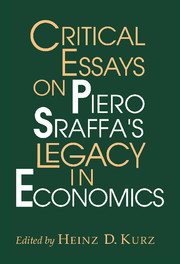Book contents
- Frontmatter
- Contents
- Preface
- List of contributors
- Part I Introduction
- Part II Returns to scale, demand, money and interest, and the classical tradition
- 3 Sraffa's hits and misses
- 4 Sraffa on demand: a textual analysis
- 5 Malthus and the corn–profit model
- 6 The Hayek–Keynes–Sraffa controversy reconsidered
- Part III Long-period theory and the problem of capital
- Part IV Intertemporal equilibrium theory and the problem of capital
- Mathematical Note by Michele Tucci
- Author index
- Subject index
5 - Malthus and the corn–profit model
Published online by Cambridge University Press: 05 June 2012
- Frontmatter
- Contents
- Preface
- List of contributors
- Part I Introduction
- Part II Returns to scale, demand, money and interest, and the classical tradition
- 3 Sraffa's hits and misses
- 4 Sraffa on demand: a textual analysis
- 5 Malthus and the corn–profit model
- 6 The Hayek–Keynes–Sraffa controversy reconsidered
- Part III Long-period theory and the problem of capital
- Part IV Intertemporal equilibrium theory and the problem of capital
- Mathematical Note by Michele Tucci
- Author index
- Subject index
Summary
Introduction
This chapter provides textual evidence indicating that Sraffa's famous corn–profit interpretation of the early Ricardo (Sraffa, 1951, p. xxxi; 1960, p. 93) applies in fact to T. R. Malthus. Faccarello has observed: ‘If indeed such a corn–profit model was really formulated, it took shape, for a brief period of time, in Malthus's fancy’ (1982, p. 134), an allusion to the possible attribution to Ricardo by Malthus of such a model in the early correspondence. I shall demonstrate, rather, a positive adherence by Malthus – the ‘mature’ Malthus of the Principles and thereafter – to the priority of distribution over pricing, with the profit rate determined in the wage–goods (corn) sector as a ratio of physically homogenous output and input to which profit rates in other industries adjust by way of their terms of trade with corn. Various criticisms of this interpretation will be considered.
The sense of Malthus's adherence to a corn–profit model must be well understood. Malthus was aware that the profit rate is conventionally defined as ratio of values, and indeed in his chapter ‘Of the Profits of Capital’ in the Principles of Political Economy he identifies the profit rate with ‘the proportion which the difference between the value of the advance and the value of the commodity produced bears to the value of the advances’ (1820, p. 294; cf. a similar formulation in 1836, p. 263, discussed in Section 4).
- Type
- Chapter
- Information
- Critical Essays on Piero Sraffa's Legacy in Economics , pp. 198 - 256Publisher: Cambridge University PressPrint publication year: 2000



